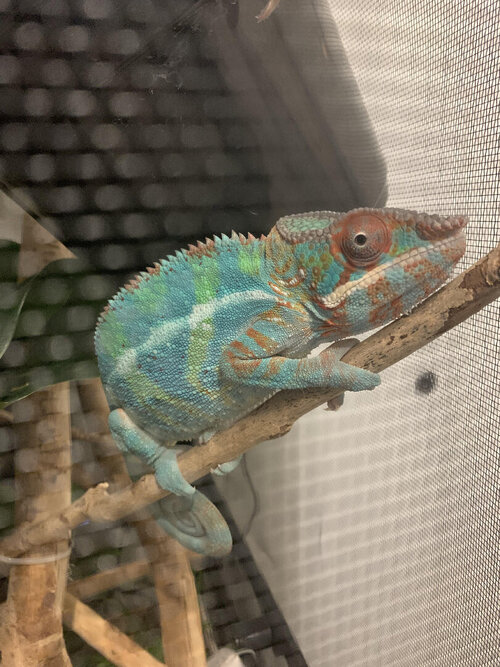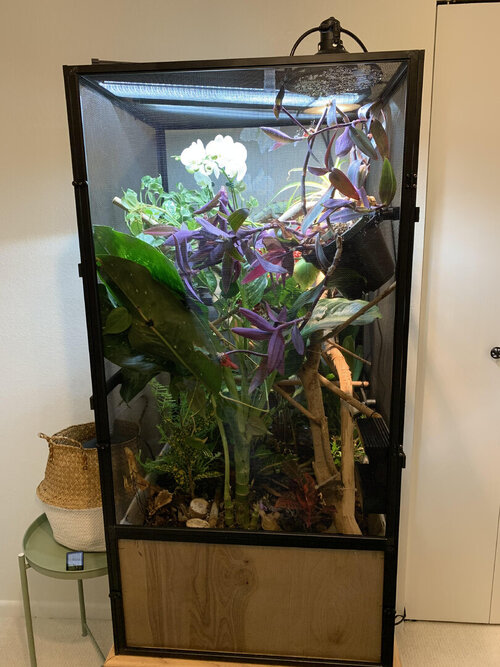kwilson730
New Member
Chameleon Info:
Cage Info:
Current Problem - Last night, I came into my office where we keep Itzel and saw that he had a piece of sphagnum moss in his mouth about the size of a large dubia roach. It looked as though he thought he saw a bug that he was trying to catch- I suspect one of the isopods since he has a bioactive enclosure and we always feed him from a cup. This is the first time since we got him in May that I've ever seen him do something like this- he typically does not venture this low in his enclosure. He started swallowing the sphagnum moss before I had the chance to try and take it out of his mouth. Apparently my fiancé had emptied out some of the sphagnum moss from an orchid that was in his enclosure the other day not knowing the risk for impaction it could pose (UGH!). I know nobody can give us a guaranteed answer, but hoping for some peace of mind and insight. Have any of y'all ever had this happen before with your cham? Based off the info shared, does anyone have any insight into what they believe the risk for impaction is? High? Low? The sphagnum moss he ate looked to be fairly sparse and not a dense chunk if that makes sense. I also believe the sphagnum moss may have been somewhat moist and not completely dry. I spent hours researching old threads here last night on how to treat impaction should that occur. We will be going to get him hornworms today and increasing his mistings over the next few days. From what I read, hydration seems to be a key element in preventing impaction? I saw a couple posts urging not to over feed if you think impaction might be a risk, so we will probably keep his food to a bare minimum over the next few days as well while we wait and hope for a healthy bowel movement from him. We have not fed him anything yet today. So far, we do not notice any changes to his appearance or behavior. I have since gone in and removed all of the sphagnum moss I found in his cage. Any advice on tending to this mater is greatly appreciated! Thanks so much to everyone in advance! Attached below are photos of our handsome boy (taken a few weeks ago) and of his enclosure (taken today).


- Your Chameleon - Ambilobe Panther Chameleon, M, 9 months. Itzel has been in our care since May of 2022.
- Handling - We handle approximately once every 3-4 weeks.
- Feeding - Itzel is fed a mixture of sm BSFL, sm or med dubia roaches, sm super worms, lg crickets and the occasional sm hornworms. We feed about 10-15 bugs total everyday currently since he is under 1yo. We gut load with fresh vegetables like sweet potato, etc.
- Supplements - We dust with calcium with no d3 daily (RepCal), twice a month dust with calcium with d3 (RepCal), and twice a month multi vit with no d3 (ZooMed Reptivite). On the 4 days a month we dust with calcium with d3 (RepCal) and the multi vit with no d3 (ZooMed Reptivite), that is the only supp we're using, not doubling down on supps, etc.
- Watering - Our watering schedule is based off the watering schedule the Chameleon Academy recommends on their panther chameleon care guide sheet- we follow it to a T. We use filtered and distilled water. We have not seen Itzel drink before.
- Fecal Description - Itzel has never been tested for parasites. Itzel has healthy fecals from what we can tell. They are pretty large in size tbh, LOL. They don't appear to be dry and are mostly brown with a healthy amount of all white uriate.
- History - We got Itzel from a reputable breeder, and he's been a healthy boy with no issues for as long as we've had him!
Cage Info:
- Cage Type - X-Large ZooMed Reptibreeze- 48x24x24
- Lighting - Arcadia 6% UVB t5 ho (for UVB), halogen lightbulb for basking (unsure of wattage), and an LED plant light (unsure of brand). We follow the Chameleon Academy's lighting schedule recommendation for Panther Chameleons to a T.
- Temperature - We track our temp with Govee Thermo-Hygrometer. The lowest the temp gets towards the bottom of his enclosure is 63 F. His basking temp is 85 F. Average temp in his cage is 70-75 F.
- Humidity - We track our humidity with Govee Thermo-Hygrometer. We are creating and maintaining these levels with a MistKing mister and fogger. Our levels range from 40%-70%. We just ordered Duck brand Window Kit (recommended by Chameleon Academy) to put on 3 sides of his all screen enclosure to help us with bringing humidity levels up, as we know they should be getting higher at night.
- Plants - We only use live plants and have a bioactive setup. On the floor we have a mixture of ferns and crotons. Throughout the rest of his enclosure we have a mixture of pothos, spider plant, wandering jew, and orchids.
- Placement - Itzel's cage is kept in my work office. It is not near any fans, air vents, or high traffic areas. The height of the top of the cage relative to room floor is about 55inches.
- Location - Eastern WA, USA
Current Problem - Last night, I came into my office where we keep Itzel and saw that he had a piece of sphagnum moss in his mouth about the size of a large dubia roach. It looked as though he thought he saw a bug that he was trying to catch- I suspect one of the isopods since he has a bioactive enclosure and we always feed him from a cup. This is the first time since we got him in May that I've ever seen him do something like this- he typically does not venture this low in his enclosure. He started swallowing the sphagnum moss before I had the chance to try and take it out of his mouth. Apparently my fiancé had emptied out some of the sphagnum moss from an orchid that was in his enclosure the other day not knowing the risk for impaction it could pose (UGH!). I know nobody can give us a guaranteed answer, but hoping for some peace of mind and insight. Have any of y'all ever had this happen before with your cham? Based off the info shared, does anyone have any insight into what they believe the risk for impaction is? High? Low? The sphagnum moss he ate looked to be fairly sparse and not a dense chunk if that makes sense. I also believe the sphagnum moss may have been somewhat moist and not completely dry. I spent hours researching old threads here last night on how to treat impaction should that occur. We will be going to get him hornworms today and increasing his mistings over the next few days. From what I read, hydration seems to be a key element in preventing impaction? I saw a couple posts urging not to over feed if you think impaction might be a risk, so we will probably keep his food to a bare minimum over the next few days as well while we wait and hope for a healthy bowel movement from him. We have not fed him anything yet today. So far, we do not notice any changes to his appearance or behavior. I have since gone in and removed all of the sphagnum moss I found in his cage. Any advice on tending to this mater is greatly appreciated! Thanks so much to everyone in advance! Attached below are photos of our handsome boy (taken a few weeks ago) and of his enclosure (taken today).






